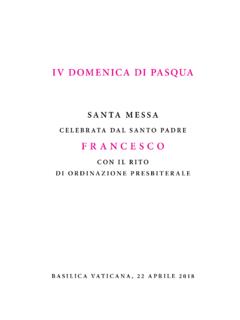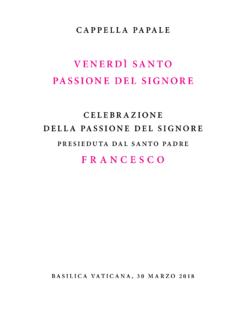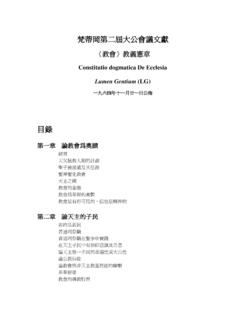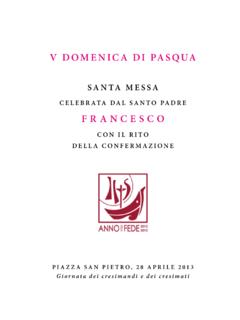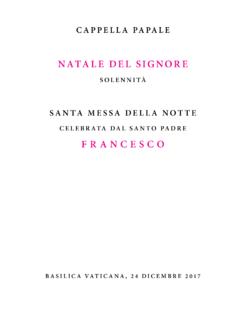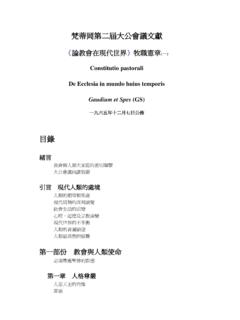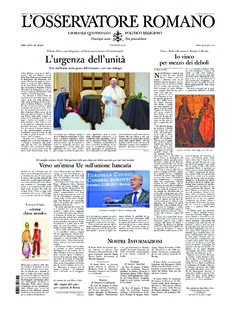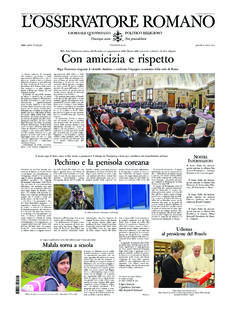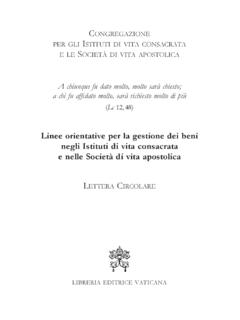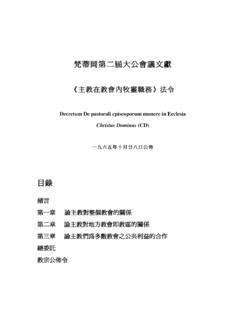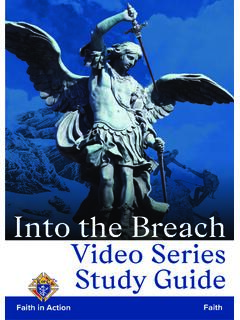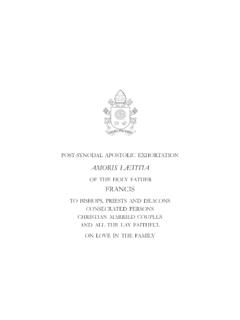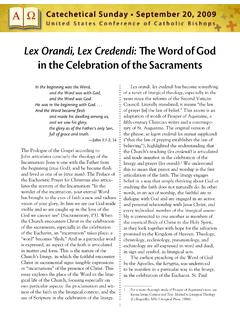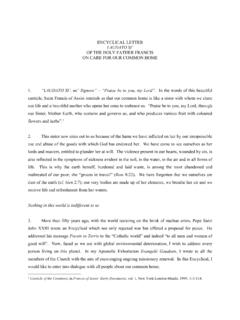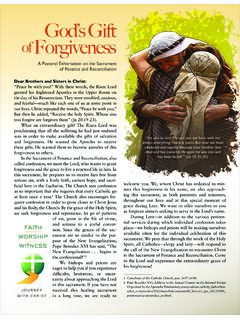Transcription of The Holy See - Vatican
1 The holy SeeCONFERRAL OF THE CHARLEMAGNE PRIZEADDRESS OF HIS HOLINESS POPE FRANCISSala RegiaFriday, 6 May 2016[Multimedia]Distinguished Ladies and Gentlemen,I offer you a cordial welcome and I thank you for your presence. I am particularly grateful toMessrs Marcel Philipp, J rgen Linden, Martin Schulz, Jean-Claude Juncker and Donald Tusk fortheir kind words. I would like to reiterate my intention to offer this prestigious award for Europe. Forours is not so much a celebration as a moment to express our shared hope for a new andcourageous step forward for this beloved , genius and a capacity for rebirth and renewal are part of the soul of Europe. In the lastcentury, Europe bore witness to humanity that a new beginning was indeed possible. After yearsof tragic conflicts, culminating in the most horrific war ever known, there emerged, by God s grace,something completely new in human history.
2 The ashes of the ruins could not extinguish theardent hope and the quest of solidarity that inspired the founders of the European project. Theylaid the foundations for a bastion of peace, an edifice made up of states united not by force but byfree commitment to the common good and a definitive end to confrontation. Europe, so longdivided, finally found its true self and began to build its family of peoples ,[1] which has commendably expanded in the meantime, seems of late tofeel less at home within the walls of the common home. At times, those walls themselves havebeen built in a way varying from the insightful plans left by the original builders. Their new andexciting desire to create unity seems to be fading; we, the heirs of their dream, are tempted toyield to our own selfish interests and to consider putting up fences here and there.
3 Nonetheless, Iam convinced that resignation and weariness do not belong to the soul of Europe, and that even our problems can become powerful forces for unity .[2]In addressing the European Parliament, I used the image of Europe as a grandmother. I noted thatthere is a growing impression that Europe is weary, aging, no longer fertile and vital, that the greatideals that inspired Europe seem to have lost their appeal. There is an impression that Europe isdeclining, that it has lost its ability to be innovative and creative, and that it is more concerned withpreserving and dominating spaces than with generating processes of inclusion and change. Thereis an impression that Europe is tending to become increasingly entrenched , rather than open toinitiating new social processes capable of engaging all individuals and groups in the search fornew and productive solutions to current problems.
4 Europe, rather than protecting spaces, is calledto be a mother who generates processes (cf. apostolic exhortation Evangelii Gaudium, 223).What has happened to you, the Europe of humanism, the champion of human rights, democracyand freedom? What has happened to you, Europe, the home of poets, philosophers, artists,musicians, and men and women of letters? What has happened to you, Europe, the mother ofpeoples and nations, the mother of great men and women who upheld, and even sacrificed theirlives for, the dignity of their brothers and sisters?The writer Elie Wiesel, a survivor of the Nazi death camps, has said that what we need today is a memory transfusion . We need to remember , to take a step back from the present to listen tothe voice of our forebears. Remembering will help us not to repeat our past mistakes (cf.)
5 EvangeliiGaudium, 108), but also to re-appropriate those experiences that enabled our peoples to surmountthe crises of the past. A memory transfusion can free us from today s temptation to build hastily onthe shifting sands of immediate results, which may produce quick and easy short-term politicalgains, but do not enhance human fulfilment (ibid., 224).To this end, we would do well to turn to the founding fathers of Europe. They were prepared topursue alternative and innovative paths in a world scarred by war. Not only did they boldlyconceive the idea of Europe, but they dared to change radically the models that had led only toviolence and destruction. They dared to seek multilateral solutions to increasingly Schuman, at the very birth of the first European community, stated that Europe will not bemade all at once, or according to a single plan.
6 It will be built through concrete achievementswhich first create a de facto solidarity .[3] Today, in our own world, marked by so much conflictand suffering, there is a need to return to the same de facto solidarity and concrete generosity thatfollowed the Second World War, because, as Schuman noted, world peace cannot besafeguarded without making creative efforts proportionate to the dangers threatening it .[4] Thefounding fathers were heralds of peace and prophets of the future. Today more than ever, theirvision inspires us to build bridges and tear down walls. That vision urges us not to be content withcosmetic retouches or convoluted compromises aimed at correcting this or that treaty, butcourageously to lay new and solid foundations. As Alcide De Gasperi stated, equally inspired byconcern for the common good of our European homeland , all are called to embark fearlessly on a2 construction project that demands our full quota of patience and our ongoing cooperation.
7 [5]Such a memory transfusion can enable us to draw inspiration from the past in order to confrontwith courage the complex multipolar framework of our own day and to take up with determinationthe challenge of updating the idea of Europe. A Europe capable of giving birth to a newhumanism based on three capacities: the capacity to integrate, the capacity for dialogue and thecapacity to capacity to integrateErich Przywara, in his splendid work Idee Europa [The Idea of Europe], challenges us to think ofthe city as a place where various instances and levels coexist. He was familiar with thereductionist tendency inherent in every attempt to rethink the social fabric. Many of our cities areremarkably beautiful precisely because they have managed to preserve over time traces ofdifferent ages, nations, styles and visions.
8 We need but look at the inestimable cultural patrimonyof Rome to realize that the richness and worth of a people is grounded in its ability to combine allthese levels in a healthy coexistence. Forms of reductionism and attempts at uniformity, far fromgenerating value, condemn our peoples to a cruel poverty: the poverty of exclusion. Far frombestowing grandeur, riches and beauty, exclusion leads to vulgarity, narrowness, and cruelty. Farfrom bestowing nobility of spirit, it brings roots of our peoples, the roots of Europe, were consolidated down the centuries by theconstant need to integrate in new syntheses the most varied and discrete cultures. The identity ofEurope is, and always has been, a dynamic and multicultural activity cannot fail to see the urgency of this fundamental task.
9 We know that the whole isgreater than the part, but it is also greater than the sum of the parts , and this requires that wework to broaden our horizons and see the greater good which will benefit us all (EvangeliiGaudium, 235). We are asked to promote an integration that finds in solidarity a way of acting, ameans of making history. Solidarity should never be confused with charitable assistance, butunderstood as a means of creating opportunities for all the inhabitants of our cities and of somany other cities to live with dignity. Time is teaching us that it is not enough simply to settleindividuals geographically: the challenge is that of a profound cultural community of European peoples will thus be able to overcome the temptation of falling backon unilateral paradigms and opting for forms of ideological colonization.
10 Instead, it will rediscoverthe breadth of the European soul, born of the encounter of civilizations and peoples. The soul ofEurope is in fact greater than the present borders of the Union and is called to become a model ofnew syntheses and of dialogue. The true face of Europe is seen not in confrontation, but in therichness of its various cultures and the beauty of its commitment to openness. Without thiscapacity for integration, the words once spoken by Konrad Adenauer will prove prophetic: the3future of the West is not threatened as much by political tensions as by the danger of conformism,uniformity of thoughts and feelings: in a word, by the whole system of life, by flight fromresponsibility, with concern only for oneself. [6]The capacity for dialogueIf there is one word that we should never tire of repeating, it is this: dialogue.
